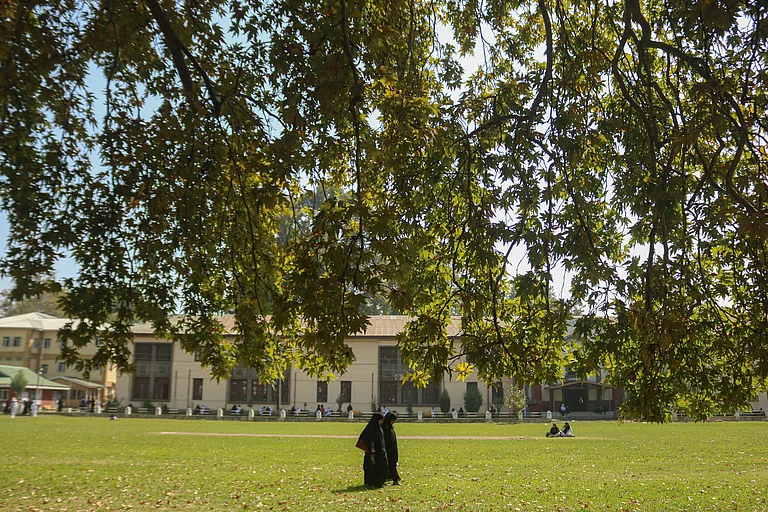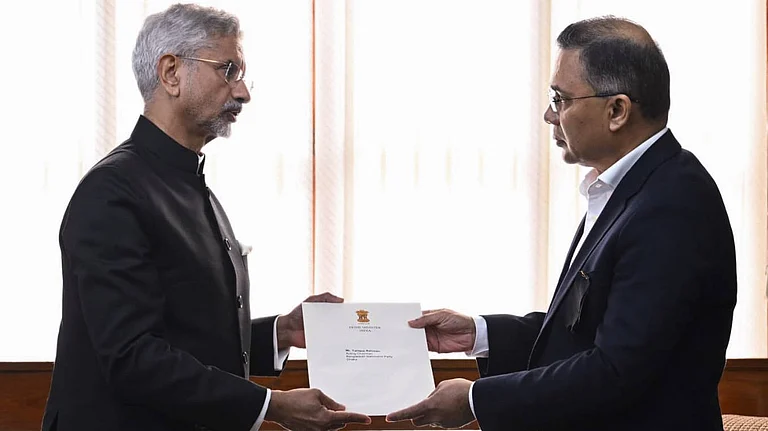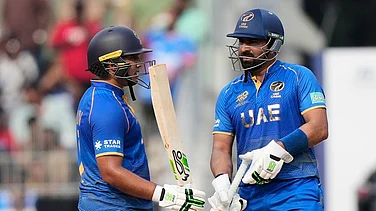Now, why does Sunanda Pushkar sound preposterous when she says it’s insulting to present her as just a proxy for good friend Shashi Tharoor, minister of state for external affairs, in the multi-million dollar IPL franchise sale? Because it’s a bit ambitious on her part to claim she’s a businesswoman in her own right when her present job profile says she is a mere sales manager at TECOM Investments, a commercial real estate company in Dubai. But you’ve got to hand it to Pushkar, for her spunk and drive that took her from a gawkish girl from small-town Jammu two decades ago, to becoming swell Sue in Dubai and Toronto, to contriving her new image as swanky Sunanda, the brassy, bold entrepreneur of the eye-popping Emirates.

The belle from Bomai, a small apple-growing hamlet in Sopore, Kashmir, was convinced she was not cut out for the idyllic life of mofussil India, as she excitedly told her pals when she landed in Dubai in the early ’90s, and like the many hick-chicks before her, she took the marriage route to escape a dreary future. The teenaged Sunanda met and married fellow Kashmiri Pandit Sanjay Raina, a hotel management graduate, while she was still studying in the Government College for Women, Srinagar, between 1986 and 1988.
But it wasn’t Raina who took her to Dubai; it was his best friend, Sujith Menon, whom she married within two years of her failed first marriage. The couple landed in Dubai in the early ’90s—Menon settled in a job with the insurance company, Eagle Star, while Sunanda worked as an accounts exec with the marketing and ad agency, Bozell Prime. Their lives would have soon settled into a mundane routine if it were not for Sunanda’s hyper hunger to rise above the plain folks. She begged her friends for invitations to glam events and then cashed in on the ’90s marketing trends of organising small-time fashion shows.
She soon catapulted into the world of event management, of the C-class variety—of starlets and bimbos—but stunned her colleagues with her insatiable ambition. She figured out the magic formula and began networking hard and fast—tying up with artists, getting sponsors, and making a small, tidy profit from the enterprise. Her skills in occasionally getting well-known sponsors made her rivals green with envy but the snide bitching barely fazed her. Says a former rival acidly, “Sunanda would claw her way to a sponsor and have him eating out of her hands, she was not a girl’s girl.”
Not surprisingly, Sunanda was leaving not just her friends behind but her husband too. Their last attempt to save the marriage in a collaborative business deal was disastrous both financially and emotionally. They staged a fashion event which turned out to be a dud, and Menon had to finally leave Dubai after falling out with his company. He, tragically, took his own life later in India.
Sunanda, though, continued to live in Dubai with her son, struggling as a small-time event manager. She moved in as a paying guest with a girlfriend in the more modest suburb of Satwa, in a pokey apartment above a supermarket, changed her name to Sue, in middle-class western-trendy, unusually adopted her father’s name Poshkar (and turned it to Pushkar), rather than the surname, Dass. Her business card read Sue P. Menon, and till today, Dubai knows her as Sue rather than the vernacular Sunanda.
By the late ’90s, Sunanda had joined the emigre rush to Canada, and moved to Toronto with her son and a new banker companion. But she hated her life in an Indian ghetto in a white town, and yearned to return to dazzling Dubai. She was back in Dubai within a few years, but this time with a Canadian citizenship and passport to boot. Her new status liberated her from the tough immigration rules and visa restrictions reserved for South Asian citizens, and she soon saw an opportunity in this new-found freedom.
By 2005, Sunanda had joined TECOM, and was poised to ride the wave of the swelling real estate boom. A famous socialite in Delhi remembers meeting her a year later in the Capital when she was introduced as the companion of another successful Kashmiri businessman living between Dubai and London. “She was soon handing out business cards as a real estate promoter,” says the social queen, “and inviting people for investment opportunities in booming Dubai. She struck me as someone on the go, but I must confess I didn’t recognise her in the pictures today, she looks quite different.”

Christa Giles, Tharoor’s wife
Sunanda-watchers in Dubai say it was around this time she adopted her new style statement—Dubai flash trash of peroxide hair streaks, heavy make-up, razzle-dazzle, seductive couture, false eyelashes, chrome nail paint, and Louis Vuitton victimhood. It was a sign of her arrival in the league of the neo-rich tycoons.
It was also the time (2007) when Tharoor and his Canadian wife Christa Giles (he had been earlier married to Tilottama Mukherjee) landed in Dubai to take up residency after he joined the investment firm, Afras Ventures. They were on opposite sides of the glistening turf—while Tharoor and wife were cocooned with the Big Boys from Kerala, Sunanda was the p3p Queen of Masala Dubai, chasing the glittering mirage with vampire-like thirst—hyper networking and coursing business deals. Then Dubai was Las Vegas on acid, the boardroom was the lounge bar, the deal room was the penthouse. It was party time.
And as Sunanda orbited faster into the inner circles of the mega rich—she was now the exotic Sunanda from Kashmir—she and Tharoor met in October 2009, at a soiree hosted by Sunny Varkey, the billionaire owner of the GEMS education empire, and the evening turned electric.
It was a whirlwind affair and to Tharoor’s credit, he outed Sunanda almost immediately, especially in Delhi, as the official consort of the MoS, external affairs. Their eagerness to be accepted in the power capital was evident with their presence at every social do and event. Sure, it’s hard to make friends when you are living between two cities, but as a hostess sniffs, “Sunanda invites people she meets on a plane for an intimate dinner with the minister. It may be first class but this is not Dubai, this is Delhi, where pedigree counts, not wannabe.”
So, will Tharoor give up the chair for his lady love? It’s a 21st-century tale of love in the time of opportunity.

























